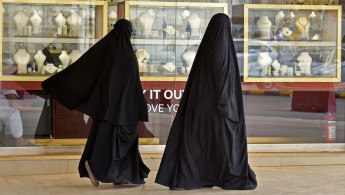Saudi Shura Council postpones reforms forcing husbands to come clean about having multiple wives
Saudi Arabia's Shura Council has rejected proposed reforms that would force Saudi men to come clean about having multiple wives and strip males of the power to ban female relatives from travelling abroad.
The Shura Council, which is the formal advisory body of the kingdom but with no real legislative powers, deferred a number of recommendations for the ministry of justice, Al Madina reported on Wednesday.
One of the recommendations demanded a mechanism be established in courts to ensure woman are aware in the event her husband is already married.
The trend of polygamy - marrying more than one wife - has been relatively common in the kingdom, but local media suggest this concept is becoming increasingly unpopular with Saudi women.
With divorces in the Gulf state increasing by 30 percent during the coronavirus crisis, local media attributed the rise to Saudi women discovering during lockdown that their husbands had secretly married a second wife.
The council also deferred a recommendation requiring the ministry of justice reject cases of absenteeism against women over the age of 21.
This ruling appears to uphold the ability of Saudi men to file lawsuits of absenteeism against their female relatives and contradicts much-touted reforms that allowed women to travel abroad without permission from male guardians.
Reforms introduced last year allowed Saudi women over the age of 21 to travel abroad, in theory, without a male guardian.
Eqbal Darandari's proposal called on the ministry of justice to work with the Supreme Judicial Council to amend the necessary laws that would allow adult women to marry a partner without the permission of a male relative, according to a report by Al Riyadh.
The council rejected the proposal, saying the presence of a male guardian is a key condition to officiate a marriage.
Saudi Arabia notoriously restricts women's rights under its male guardianship system, which according to the Human Rights Watch lets a man "control a Saudi woman's life from her birth until her death".
Saudi women are required by law to have a male guardian, often the father, husband or brother, who have the power to make decisions critical to the outcome of their lives.
A Saudi woman is not allowed to legislate her marriage without the approval of an assigned guardian.
Saudi Arabia has recently introduced social reforms, permitting concerts and movie theatres, which were once banned. Although these measures have helped open up the rigidly-controlled society, they are also motivated by a desire to establish new revenue-generating industries, analysts have said.
Read more: Women in Saudi Arabia struggle for work due to coronavirus pandemic
Saudi women were also finally granted the right to drive in 2018, along with other publicised reforms that intended to promote Crown Prince Mohammed bin Salman's image as a reformer.
But the measures have been criticised by rights organisations and critics of the Saudi regime, who say the reforms are a smokescreen intended to mask reports of continuing human rights abuses.
This includes the imprisonment of 11 women's rights activists just weeks ahead of a decision to lift the driving ban.
Critics also say the reforms are designed to facilitate foreign investment and tourism in the country as Crown Prince Mohammad bin Salman attempts to steer the kingdom out of oil dependency.
Agencies contributed to this report
Follow us on Facebook, Twitter and Instagram to stay connected





 Follow the Middle East's top stories in English at The New Arab on Google News
Follow the Middle East's top stories in English at The New Arab on Google News
![Israeli forces ordered bombed Gaza's Jabalia, ordering residents to leave [Getty]](/sites/default/files/styles/image_330x185/public/2176418030.jpeg?h=a5f2f23a&itok=_YGZaP1z)

